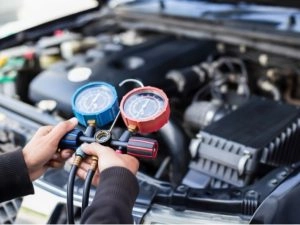The air conditioning cooler is a fundamental part of the car's air conditioning system, where it works to cool and clean the air circulating inside the vehicle. Over time and with repeated use, the cooler may encounter some problems and malfunctions that affect its performance and limit its ability to efficiently cool the air.
In order to maintain the performance of your car's air conditioner compressor and avoid problems resulting from its damage, drivers should know some of the signs that indicate its damage.
In this article, we will take a look at some common signs that indicate damage to your car's air conditioner compressor and hinder its performance, enabling users to take necessary actions to fix it and maintain its good performance.

Signs of Air Conditioner Radiator Damage
Cooling System Weakness
The lack of cooling is one of the most prominent problems facing the car's air conditioner. This problem can be attributed to several different reasons, some of the most notable are:
Gas leakage
Gas leakage from the air conditioner's refrigerant is one of the main reasons for the cooling inefficiency, as it reduces the amount of gas flowing from the air conditioner, thereby decreasing its effectiveness in cooling the air. In this case, immediate maintenance is required to repair the leakage.
The compressor is not working properly.
The compressor is an important part in the air cooling process, as it works to increase the pressure inside the refrigerator and push the gas to the cooling lines. When the compressor is exposed to any malfunction, this leads to a decrease in cooling and reduces its effectiveness.
Filter blockage
A clogged air filter in the air conditioner can impede efficient airflow within the conditioner, subsequently leading to weak cooling and the air conditioner's inability to adequately cool the air.
Low Gas:
The lack of gas in the car's air conditioning fridge could be the cause of weak cooling, and this problem can be solved by recharging the gas inside the air conditioner.
In the end, weakness in the air conditioner's cooling system necessitates the identification of the primary cause and taking necessary steps to repair the malfunction. This enables the air conditioner to perform its function correctly and provide comfort to the passengers during travel.
Also read5 Ways to Help Cool Down Your Car Engine When it Overheats Suddenly
2- Presence of a foul smell
The foul smell emanating from inside the cabin can be a sign of a problem with the air conditioner evaporator, as this smell may result from the accumulation of mold or bacteria within it. In such case, it becomes necessary to regularly clean the evaporator.
There are many reasons that lead to the presence of an unpleasant smell in the car's air conditioner fridge. Among these reasons:
Accumulation of dirt and deposits
The accumulation of dirt and deposits on the condensers and filters can lead to the damage of the air conditioner and the emission of an unpleasant odor.
Gas leakage
Gas can leak from the refrigerator, leading to a foul smell and negative impact on health.
Damage to the internal parts
Damage to the internal parts of the car's cooling system, such as the fans and condensers, may cause a foul odor.
To avoid the presence of a bad smell in the air conditioner's evaporator, it's necessary to conduct regular maintenance, change the filters regularly, clean the internal parts of the air conditioner, and avoid running the air conditioner for long periods without stopping it for maintenance and cleaning.
3- Presence of abnormal noises
The presence of abnormal noises is an indication of potential issues with the radiator.The air conditioner in the carThese sounds can be in different forms, such as whistling, clicking, loud noise, and others.
And the reasons for the existence of these sounds include:
Dust accumulation
Dirt and dust can accumulate inside the car's air conditioner, causing the filters to get clogged and the airflow to become difficult, thereby causing abnormal noises.

The Serpentine Belt:
The belt veering inside the air conditioning compressor may produce abnormal sounds, and in this case, the belt needs to be replaced with a new one.
Damage to Components:
Damage to some components inside the car's air conditioning condenser can lead to the production of abnormal sounds, such as damage to the fan or the compressor. In this case, maintenance and repair of the malfunction is necessary.
Oil Shortage:
Insufficient oil in the car's air conditioner compressor can lead to increased friction between the components, thus producing abnormal sounds. In this case, the appropriate amount of oil needs to be added.
The presence of unusual noises in your car's air conditioner requires identifying the main cause and taking the necessary steps to repair the malfunction, so that the air conditioner can operate correctly and without any abnormal sounds.
In conclusion, it is important to pay attention to these signs and take the necessary steps to repair any problems in the car's air conditioning system, in order to ensure comfort and safety during travel.

4- Water Leakage
If you notice water leaking fromAir conditioning condenserThis may be a sign of a problem with your drainage system or radiator. The air conditioner removes moisture from the air and expels it through the drainage system.
In case of a clogging or blockage in the drainage system, water may accumulate and leak from the unit. This issue can often be fixed by cleaning the drainage system or clearing the blockage.
Another possible reason for water leakage is the leakage of coolant, which is a vital component in the air conditioning system. If it begins to leak, it may also cause water to leak from the unit. A coolant leak is a more serious problem and should be handled immediately by a specialized technician.
In addition to water leakage, signs of coolant leakage can include loss of cooling capacity, or the formation of ice on the evaporator coil, or a hissing sound or bubbles coming from the unit.

Comments